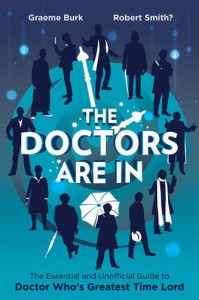
Review: The Doctors Are In

(I received an ARC of this book from the publisher via NetGalley in exchange for an honest review.)
This is the second Doctor Who nonfiction to be co-authored by Graeme Burk and Robert Smith? (The question mark is indeed part of his legal name).
The first outing, Who is the Doctor, published in 2012, gave a rundown of every episode in the Modern Series from the first through sixth seasons, with color commentary. The Doctors are In takes the same approach and applies it to the individual Doctors from both the Classic and Modern Series, dividing each chapter into a basic overview, character analysis, main companion, and defining episodes, along with great and not-so-great moments that mark each Doctor’s tenure.
This is not an objective undertaking. The work is by definition one of personal opinion, as one fan’s stand-up-and-cheer moment is another's embarrassment, and an episode that defines Who for one person is forgettable for others. The authors try to right any imbalance by comparing and contrasting their analysis, which helps promote a wider view of the various hits and misses of a show that is known for a huge variance in quality over its 50 year span. There is a lot of agreement, but there is some very pointed disagreement as well. For example, one is a decided Tennant fan, the other very much not, and both give fanboyish but evenhanded reasons why.
Stylistically it is simple enough, as each chapter is broken down into identical components and the same criteria are applied for each entry. The writing style is also very transparent, but with exceptions for some cutesy wordplay (like acrostics, etc) that reflect the overall feel for the episodes under discussion. While some may find this annoying, most of the time I found it fun and a nice way to break up what could very quickly become monotonous.
Burk and Smith? are obviously very devoted fans. They have a great deal of experience with the Classic Series as well as the Modern, but were not around for the originals, so they are also left in the dark about certain things, as is anyone who was not around to see the original BBC broadcasts of the Hartnell and Troughton years (like me) or who didn’t even discover Doctor Who until late in the Modern Series (like me again).
Again, this is not an encyclopedic guide. The choices the authors have made to include certain episodes and companions and exclude others is very much an extension of their own personal fandom, and mileage will vary according to how much you agree or disagree with their selections.
 8
8
 2
2









